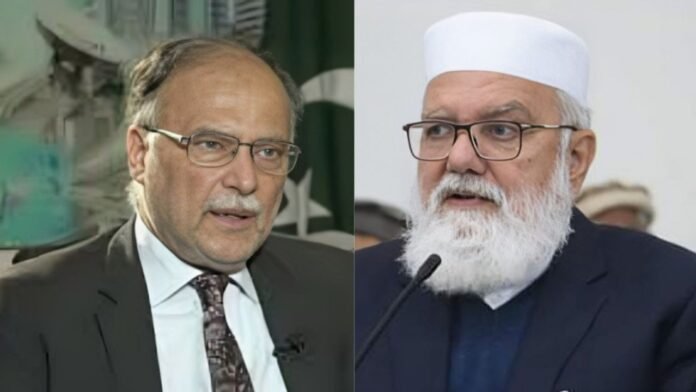Recently, Liaquat Baloch, the Deputy Amir of Jamaat-e-Islami, met Federal Minister Ahsan Iqbal in an important meeting. The negotiations on the sit-in accord have been a significant issue in political discussions over the last few weeks. This has provided another dimension of intensity to the highly charged political atmosphere, thus reflecting growing frustration between Jamaat-e-Islami and the central government.
Discussion on Sit-In Agreement
Liaqat Baloch and Federal Minister Ahsan Iqbal discussed ongoing negotiations concerning the sit-in agreement. Baloch stressed that these talks were highly vital because he said, at this point, it would become more apparent how the negotiating committee would determine the next course during its next meeting. He pointed out that they are carefully following up on the responses from the government and will decide on what steps to take based on them.
Concerns Over Government’s Stability
After their meeting, Liaqat Baloch did not hesitate to give his opinion about the present state of affairs within the Federal Government system. He regarded this administration as one of Pakistan’s weakest ever, and many opposition personalities agreed with him entirely. Moreover, according to Baloch, provincial governments seemed to be run independently, further eroding the central government’s authority, unlike past times when the presidency exclusively handled such matters. Similarly, he noted that existing differences in implementing various forms have undermined credibility and functionary ability within governance.
Ultimatum and Warning to the Government
Late Thursday evening, while talking, Liaqat Baloch issued a strong injunction against the federal government. However, he warned of severe backlash if the government ignored Jamaat-e-Islami’s request. His statement made it clear that their party’s next sit-in aims to substantially benefit the masses. This comment shows that Jamaat-e-Islami is committed to pushing the government into action rather than relying on empty promises.
This warning by Baloch shows how deeply dissatisfied the party has been with how the government handles numerous issues and that Jamaat-e-Islami is ready to intensify its protests. The leadership of this party also feels that the current administration needs to address the most pressing public concerns, leading to the possibility of taking more drastic steps.
Conclusion: A Pivotal Moment for Pakistan’s Politics
The assembly between Liaqat Baloch and Ahsan Iqbal and subsequent statements with the aid of Baloch are essential moments in Pakistani politics. With Jamaat-e-Islami taking an organizational stand and issuing a clean request, the federal authorities are under expanded stress to address the issues raised using the opposition. Thus, there can be an upsurge in political sports in the coming weeks as each party gears itself closer to the following round of negotiations, which may additionally have some distance-attaining outcomes on the governance of the US.
These annoying political surroundings underscore the challenges of dealing with the cutting-edge administration and highlight the importance of effective communique and negotiation in resolving the troubles.


